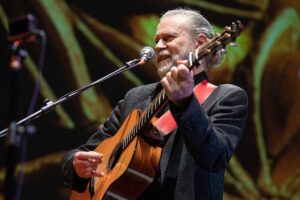Beppe Gambetta grew up in the ancient port city of Genoa, Italy. His mother and father were “opera people,” fond of music, he says. Gambetta was more than fond of it: he started playing the guitar at 11. He’d go on to become the first professional musician in his family.

Genoa has a storied musical history: it was home to the 19th century’s devilishly virtuosic violinist Niccolò Paganini and, 200 years later, to musician Fabrizio De André, whom Gambetta calls “the Leonard Cohen of Italy.” And yet, Gambetta says, “my first strong musical dream came from the United States.”
When Gambetta was a teenager, a friend’s uncle brought over an album from the Newport Folk Festival in Rhode Island. “We started to listen to the music,” says Gambetta, “and it was like a meteor was coming.” He heard Doc Watson, Mississippi John Hurt, and the plaintive, resolute plucking of bluegrass. “And so, I discovered that world.”
Now he’s a guitarist, vocalist, researcher, and composer who has made a career of performing internationally — though he still lives near Genoa, in a small town. He has released 15 albums. On Sunday, Jan. 19, Gambetta will perform pieces from his newest album, Terra Madre, at one of radio host and impresario Dinah Mellin’s Brick Hill House Concerts in East Orleans. (For the address and reservations, email or call Mellin at [email protected] or 508-255-3864.)
American music appeals to Gambetta partly because it’s a sonic melting pot, with Irish, Scottish, European, and African influences. “The American tradition has this characteristic of bringing together elements that are so completely far away from each other,” he says, noting that the fusion of those elements generates a special beauty.
“I particularly felt the beauty of the American guitar,” Gambetta says. When Doc Watson played, “even without any drums, the guitar was leading with such rhythmic joy.” The music was minimalist, he adds, but said enough to call to him. He taught himself flatpicking — a technique that involves striking the guitar strings with a pick held between the thumb and forefinger — transcribing by ear from American musicians’ recordings. In 1983, Gambetta wrote the first American-style flatpicking manual published in Italy: Manuale di Chitarra Flatpicking.
In 1985, when he was 30, Gambetta made his first trip to the States, carrying little more than his guitar. He barely spoke any English. “It was about perseverance,” he says. The American folk music community welcomed him once they became aware of him.
“I still have the first letter I wrote to Norman Blake,” the bluegrass artist and songwriter who toured with Johnny Cash, says Gambetta, “and the letter that he wrote me back, encouraging me.” Some artists invited him to their homes. He met Doc Watson backstage at a music festival. “He shook my hand,” says Gambetta. He’d go on to perform with Watson many times. When Watson died in 2012, Gambetta performed at his funeral. “And when there was a 100-year celebration of his birth a couple of years ago,” says Gambetta, “I went to his grave and brought him flowers, because he was the man who changed my life.”
Gambetta’s first album, Dialogs, was made with a tape recorder on the road. “I went door to door, knocking at the homes of my great heroes.” The album features 12 American artists.
Gambetta released Terra Madre (“Mother Earth”) in 2024. While many of his previous albums focused on tradition and reviving the music of forgotten artists, Terra Madre, which was self-produced, was more personal. “I decided that in my life, I’ve had so many nice experiences that it was time to write some songs.”

The best ideas for songs come unexpectedly, he says. “You need to be able to catch them.” He says they’ll arrive a minute before sleep or while he’s driving. “I’ll ask my wife to please give me the phone,” he says. He’ll record himself singing an idea, “because if not, it will be gone.”
The album is sung in several languages including Italian, English, and Genoese, an Italian dialect that Gambetta says has so many peculiarities it can be defined as a language all its own. He also arranged a 14th-century folk ballad in Occitan, a romance language spoken in southern France.
Gambetta used every guitar he was able to play. “Nine kinds,” he says. “The regular six-string acoustic guitar, the 12-string guitar, dobro guitar, baritone guitar, the harp guitar, different slide guitars, a banjo guitar, bouzouki guitar, and two types of Cuban tres.
“With all of these guitars, I wove a little carpet in every song,” he says. With avant-garde drummer Joe Bonadio, jazz harmonica player Howard Levy, and bassist Travis Book — all Americans — Gambetta had a symphony.
The featured single, “Sit and Pick With You,” included singer-songwriter Tim O’Brien on vocals, Dan Crary on acoustic guitar, and David Grisman, who Gambetta calls “the father of the American mandolin.” That song topped the Folk Alliance International Folk Chart in June and July. The album’s continued success on folk charts is a “source of hope,” says Gambetta. “Even if you self-produce art, you can try to touch and move something.”
Terra Madre’s songs deal with pain. “The world is passing through some dark moments,” says Gambetta. In one song, he imagines De André, the Genoese songwriter who died in 1999, watching the world with horror and confusion. But some songs also deal with dreams. “There are dreams related to minorities, dreams about natives.” One song is about refugees jumping over a border wall, dreaming of a better life.
The fourth track on the album is called “Per Poco o Per Niente,” “For Little or for Nothing.” “It was a really difficult task to write a peace song,” says Gambetta. To avoid cliché, he decided to write “a barrage of verbs.”
The lyrics (translated here) transition from violence — “They come, they hate, they beat, they laugh, they cheat, they forbid, they bind, they kill, they break, they tear, they rape, they escape, and all for little or for nothing” — to relief: “They fight, they believe, they forgive, they pray, they nurture, they hope, they play, they listen, they dance, they sing, and something remains forever.” Music is like magic, Gambetta says. “When people sing together, all differences are gone.”
The last song on the album, “Season of Suspension,” is purely instrumental. Gambetta’s picked guitar travels with a handsome confidence, intricate but untroubled, supported by forward-moving upright bass and percussion.
“It’s about a moment when all of humanity can slow down and find time to discuss solutions,” says Gambetta. “It’s a big dream, of course.” His goal, he says, was “to leave the album with this note of hope.”
In 1988, when Gambetta was 33, he was invited to perform at a folk festival in Czechoslovakia, at the time under Communist rule. Border control was severe, he says. “They woke us up in the middle of the night on the train, very rudely, and looked in every purse with flashlights.”
At the festival, Gambetta encountered a different feeling entirely. “All the young people were so happy to be able to express their art,” he says. “There was this joy to receive a foreigner from the so-called Free World.
“I was so young,” he continues. But the memory remains vivid: “I went on stage, and there were 25,000 kids in front of me.” He said ahoj, the typical greeting in Czech, meaning simply hello. “They answered so strongly, so intensely, that I felt wind on my face.”
“Many artists are talking about whether the dream of a better world is useful or not,” says Gambetta. “I think the dream is important.”
American Dream
The event: Beppe Gambetta in concert
The time: Sunday, Jan. 19, 7:30 p.m.
The place: Brick Hill House Concerts, Brick Hill Road, East Orleans
The cost: $25 suggested donation; reservations required: [email protected] or 508-255-3864



